Thesis
As of 2024, an estimated 2.5 billion people worldwide identified as Christians, accounting for nearly one-third of the world’s population. Christianity consists of various denominations, with the largest denomination being Catholics, followed by Protestants and Eastern Orthodox Christians. The Catholic Church alone had 1.3 billion adherents globally in 2024.
Despite these large numbers, religious identification and practice are transforming significantly, particularly in the Western world. In the United States, for example, the share of adults identifying as Christian has dropped from 78% in 2007 to 63% in 2023. Concurrently, the proportion of those who identify as religiously unaffiliated has nearly doubled, rising from 16% in 2007 to 28% in 2023. Similarly, participation in organized religious services has also waned, with just 30% of US adults attending in-person services at least once a month in 2022, down from 33% in 2019. Following this trend, roughly 20% of surveyed Americans said they attend religious services less often in person than before the pandemic.
However, this decline in organized religion does not indicate a retreat from spirituality for many. Among the unaffiliated — a group that includes both atheists and agnostics — approximately 80% still describe themselves as “spiritual but not religious”, demonstrating an enduring interest in a form of personal spirituality outside the bounds of institutional frameworks. Many unaffiliated individuals continue to engage in spiritual practices like prayer or meditation, with participation varying significantly by age. Among unaffiliated Americans, 41% of those aged 30-49 report praying or meditating weekly, compared to 21% aged 18-29, 26% aged 50-64, and 12% 65 and older. Furthermore, two-thirds of unaffiliated Americans continue to believe in God or a universal spirit.
At the same time, physical and mental wellness has emerged as a top priority for 82% of US consumers, driving demand for tools to combat rising rates of stress, anxiety, and depression—issues that are particularly acute among younger generations. Millennials and Gen Z, in particular, are reshaping spending habits, outspending older generations on mindfulness and mental health tools. Mindfulness meditation, in particular, has gained significant traction and is currently at the forefront of nonpharmacologic modalities for managing anxiety. During the COVID-19 pandemic, a study found that even just 10 minutes of daily meditation app use for 30 days led to a significant decrease in anxiety and improved overall well-being among study participants.
Hallow is a Catholic prayer and meditation app that provides a convenient and accessible platform for integrating prayer and mindfulness into daily life. The app attempts to foster a sense of connection and shared purpose among its users worldwide through guided meditations, daily scripture readings, and community challenges. With over a billion Catholics globally, Hallow addresses a significant opportunity to modernize faith engagement by offering a more accessible and contemporary way to connect with longstanding traditions. Rather than replacing the traditional church institution, Hallow is intended to complement them, aligning its offerings with Catholic practices to make faith-based routines more adaptable to today’s fast-paced lifestyles.
For those outside organized religion, including the growing demographic identifying as "spiritual but not religious," Hallow offers a space for self-reflection and tranquility. At a minimum, the app seeks to help users "find some place of peace amidst what is a pretty busy and stressful and anxious world." However, Hallow’s mission transcends stress relief. Its ultimate goal is "to help the world find peace & purpose through prayer & meditation, and to help [everyone] build deeper and more meaningful relationships with God." This dual focus enables Hallow to resonate with devout Catholics looking to deepen their spiritual practices and individuals exploring new pathways to spirituality outside of traditional religious frameworks.
Founding Story
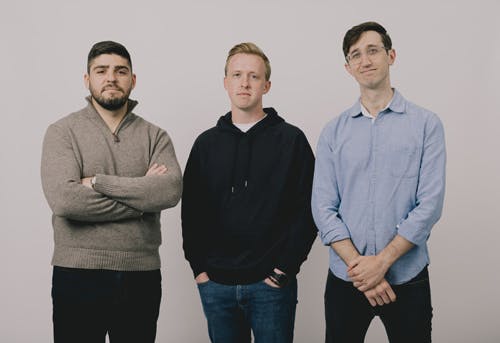
Source: Mendoza College of Business
Hallow was founded in 2018 by Alex Jones (CEO), Alessandro DiSanto, and Erich Kerekes (CTO). Jones and Kerekes studied engineering as undergrads at Notre Dame. After graduation, they worked as consultants at McKinsey, while DiSanto studied finance at Notre Dame before working in investment banking at Goldman Sachs and private equity at GTCR.
Hallow's origin is intertwined with the faith journey of Alex Jones, the CEO. Although Jones was raised Catholic, as he grew older and went through high school and college, he "fell away" from the Catholic faith. As he explained:
“I was raised 'Catholic', only in the sense that my mom dragged me to mass and the sacraments. I never prayed, certainly didn't feel any sort of community, and didn't care at all about my faith. I quickly became agnostic and even more so atheist despite coming into a [Catholic institution] like Notre Dame.”
During Jones' time as a student at Notre Dame, he met friends who would help him later to at least intellectually reconnect with his childhood faith. But as he entered the workforce, he discovered a world with "very little silence or time to pause" and became fascinated with learning more about meditation.
At first, he began to practice mindfulness meditation on popular meditation apps like Headspace and Calm to find moments of peace and stillness throughout the day. However, it was eventually during these meditation sessions that, to his surprise, Jones began to feel his mind "pull towards something spiritual" and began to wonder at the connection between meditation and faith.
At this time, Jones recognized that most of the existing meditation apps were primarily focused on teaching meditation through a secular vernacular, and he began to wonder if there was a way to meditate in a way that was more aligned with the teachings of his native Christian tradition. He and Kerekes began to ask themselves:
“Is there any kind of intersection between our Christian faith and these types of contemplative, reflective, and calming practices?”
As Jones and Kerekes started talking to priests, pastors, and fellow Christians to understand the practice of meditation in a Christian historical context, they quickly discovered "[an] incredibly rich contemplative and meditative tradition [that was already present] within the church." After Jones tried to incorporate some of these new practices of prayer, contemplation, and meditation into their daily lives and found them to be deeply impactful, they asked themselves, "how can we get these techniques out into the world in an accessible, intuitive, convenient format?" They decided to build a mobile app to answer that question, and in 2018, Hallow was born.
The name of the company, which means "to make holy," was inspired by the Lord's Prayer, which goes, "Our Father, Who art in Heaven, hallowed be Thy name" — Jones mentioned that it was in contemplating this particular prayer that changed his life and brought him back to his faith. Jones quit his consulting job and worked with DiSanto and Kerekes to code and design the app's first version. It launched in the Apple App Store and Google Play Store in December 2018, eight months after the team developed the initial concept.
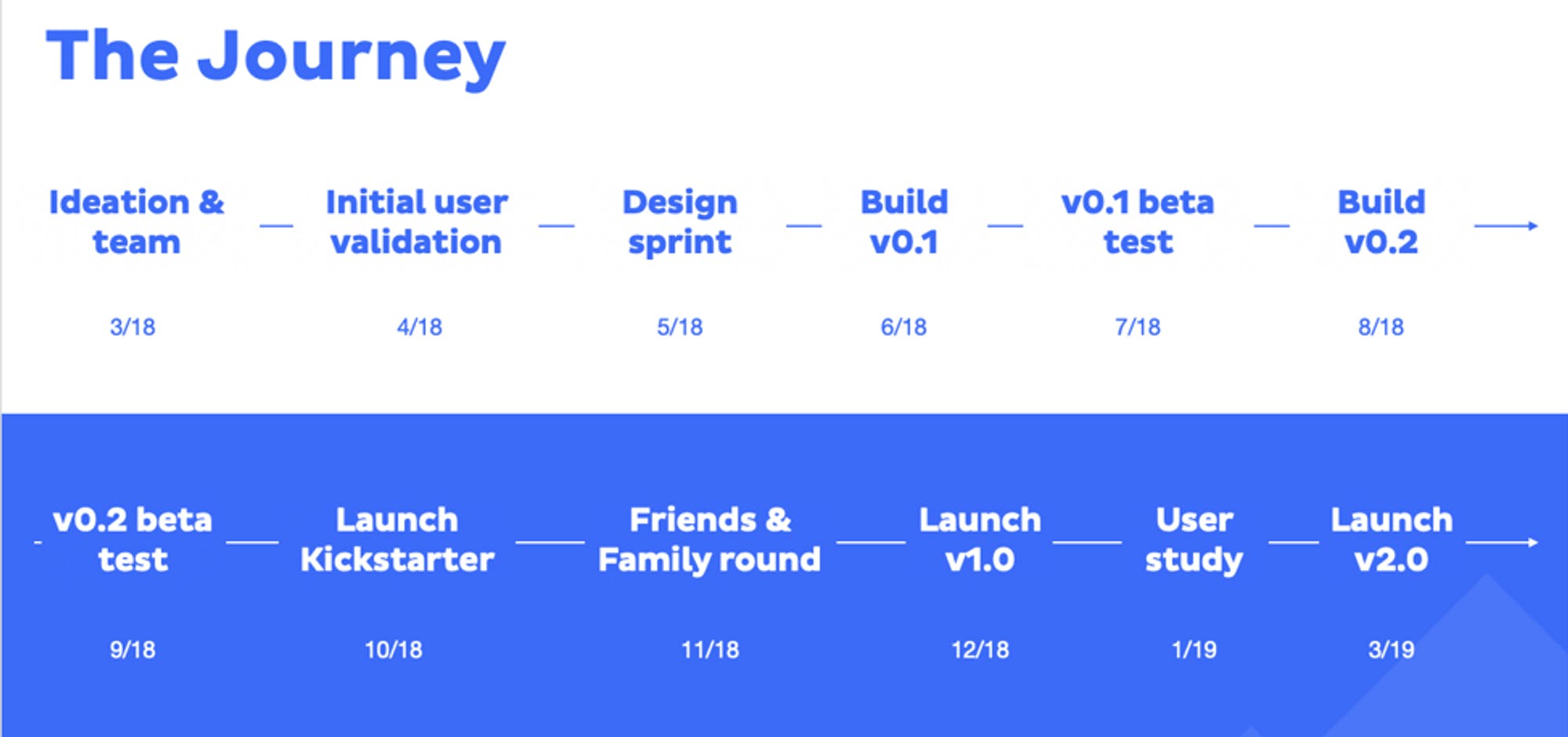
Source: Starter Story
Product
Hallow has many features geared toward helping users connect with the Catholic faith. The product is guided by the concept of Lectio Divina, a “traditional monastic practice of scriptural reading, meditation, and prayer intended to promote communion with God.” Hallow’s product takes methods of a Christian contemplation tradition that goes back thousands of years and presents them in an accessible and modern format so that users can personally curate their prayer and meditation life. As DiSanto put it:
“The Church doesn’t have a content problem, they have a marketing problem; we want to leverage the best of Silicon Valley in terms of interface, brand, and persona. We want to deliver the [same] message in a way that people aren’t used to hearing it.”
Hallow’s product provides a number of content types for users including guided meditations, daily readings, personalized prayer routines, community challenges, journaling, and sleep stories.
Guided Meditations
Hallow offers a range of guided meditations to help users deepen their prayer practice, including daily reflections, the rosary, themed meditations, and sleep meditations. Users can select meditation lengths and styles to suit their preferences and track their progress to build a consistent spiritual practice.
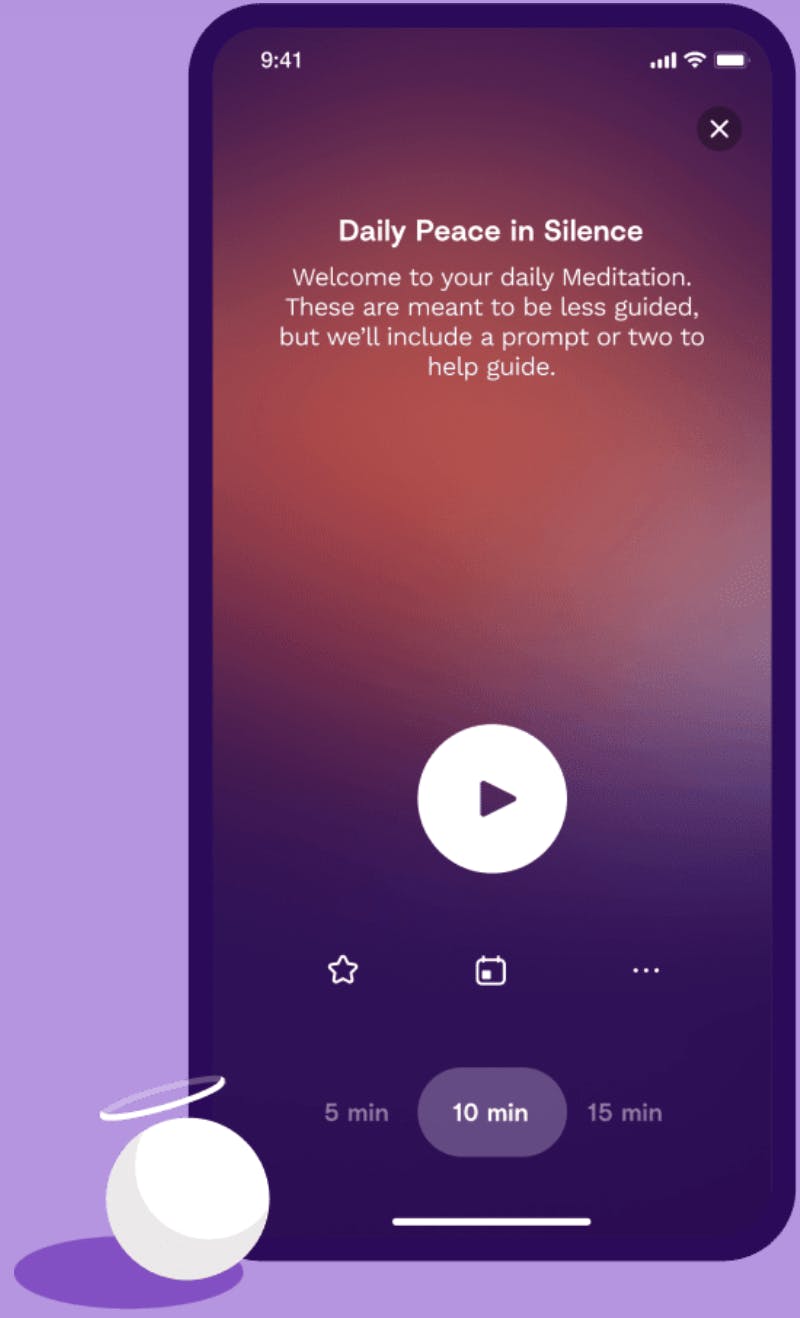
Source: Hallow
Daily Readings
Hallow provides daily readings from the Bible and other spiritual texts, along with reflections and commentary, to help users understand the text and its relevance to their lives. Users can customize their reading plans and explore different themes and topics. The app also includes the popular Bible in a Year podcast with Father Mike Schmitz.
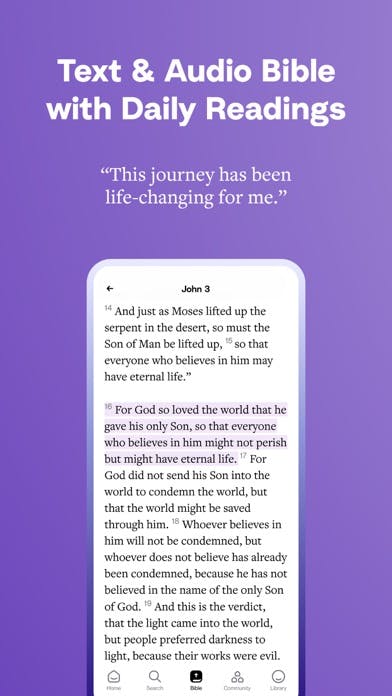
Source: Catholic Apps
Personalized Prayer Routines
Hallow allows users to personalize their prayer experience by choosing their preferred guide, setting the length of their prayer sessions, and select background music, such as Gregorian chants, to enhance their focus and connection. The app also lets users save their favorite prayers and create tailored plans aligning with their spiritual goals. Hallow helps users build and maintain a meaningful and consistent prayer routine with reminders and progress tracking.
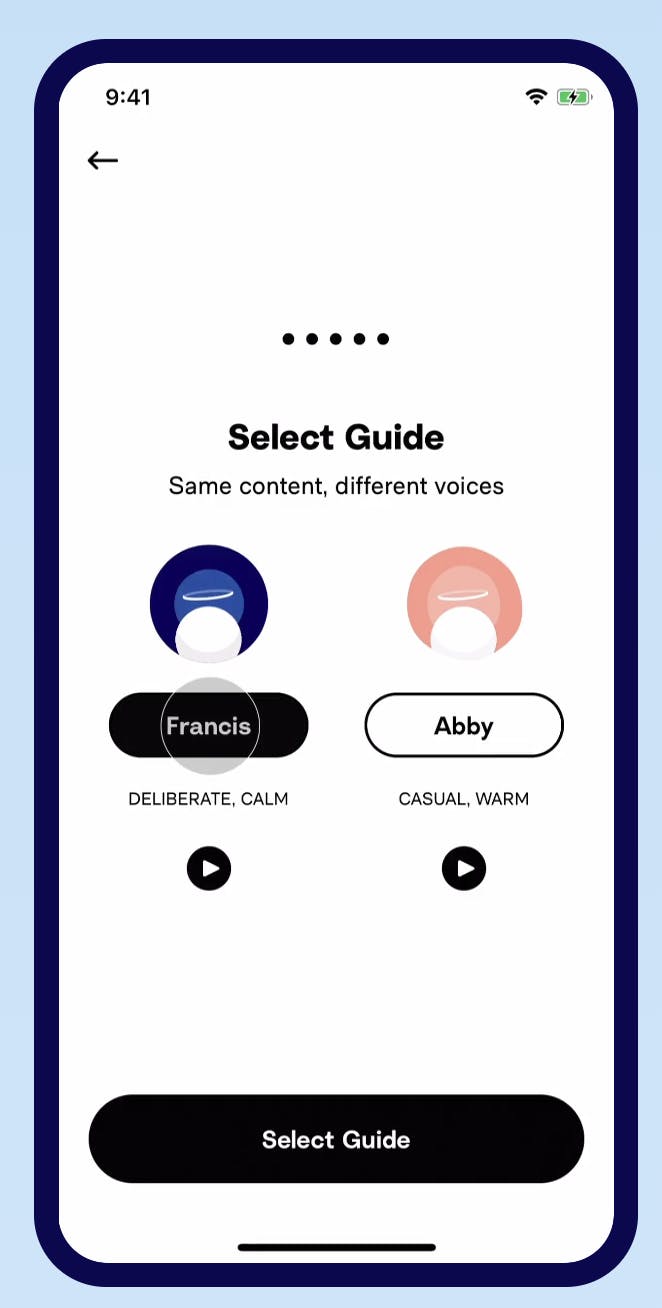
Source: Hallow
Community Challenges
Hallow offers community challenges to help users stay motivated and engaged in their prayer practice. Users can join challenges with others worldwide, set goals, and track their progress. Challenges are designed to foster a sense of community and accountability among users. For example, for several years in a row, Hallow has hosted a Pray40 community challenge during the 40 days of Lent.
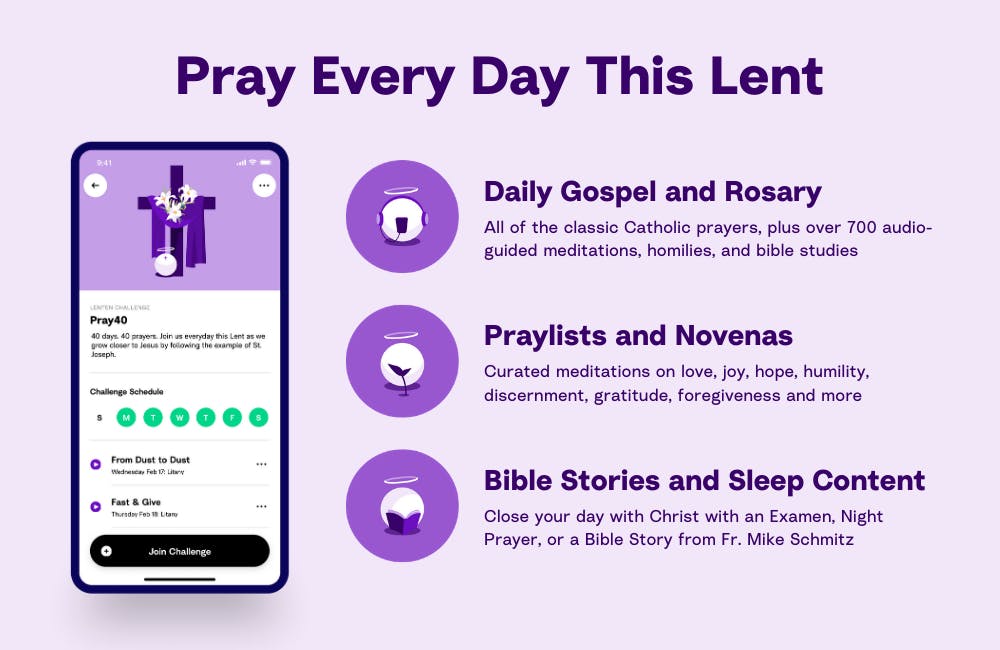
Source: Hallow
Besides participating in global community challenges, Hallow allows users to create or join personalized prayer groups called “Prayer Families.” This feature enables users to connect with friends, family, or parish members privately and meaningfully. Prayer Families provide a space for sharing intentions, tracking collective goals, and supporting each other. This feature helps users build a sense of community tailored to their unique relationships and faith practices by fostering closer connections and accountability.
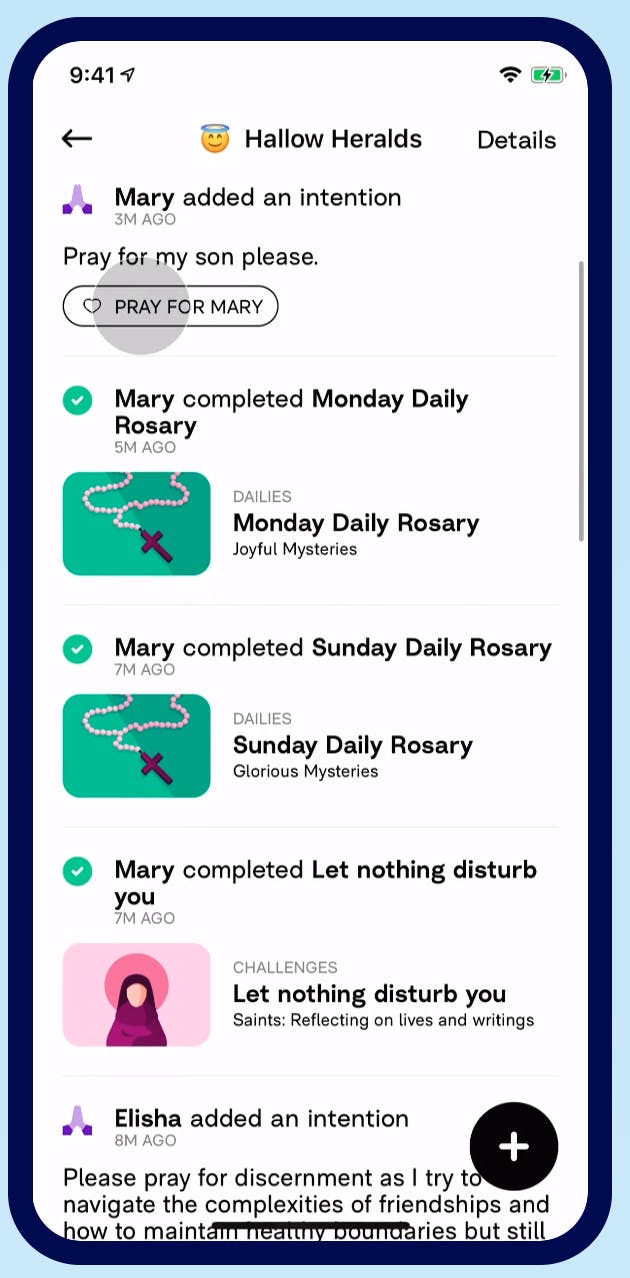
Source: Hallow
Sleep Stories
Hallow's stories are designed to help users sleep more peacefully. Users can choose from different stories and themes and listen to soothing sounds and music to help them unwind and relax.
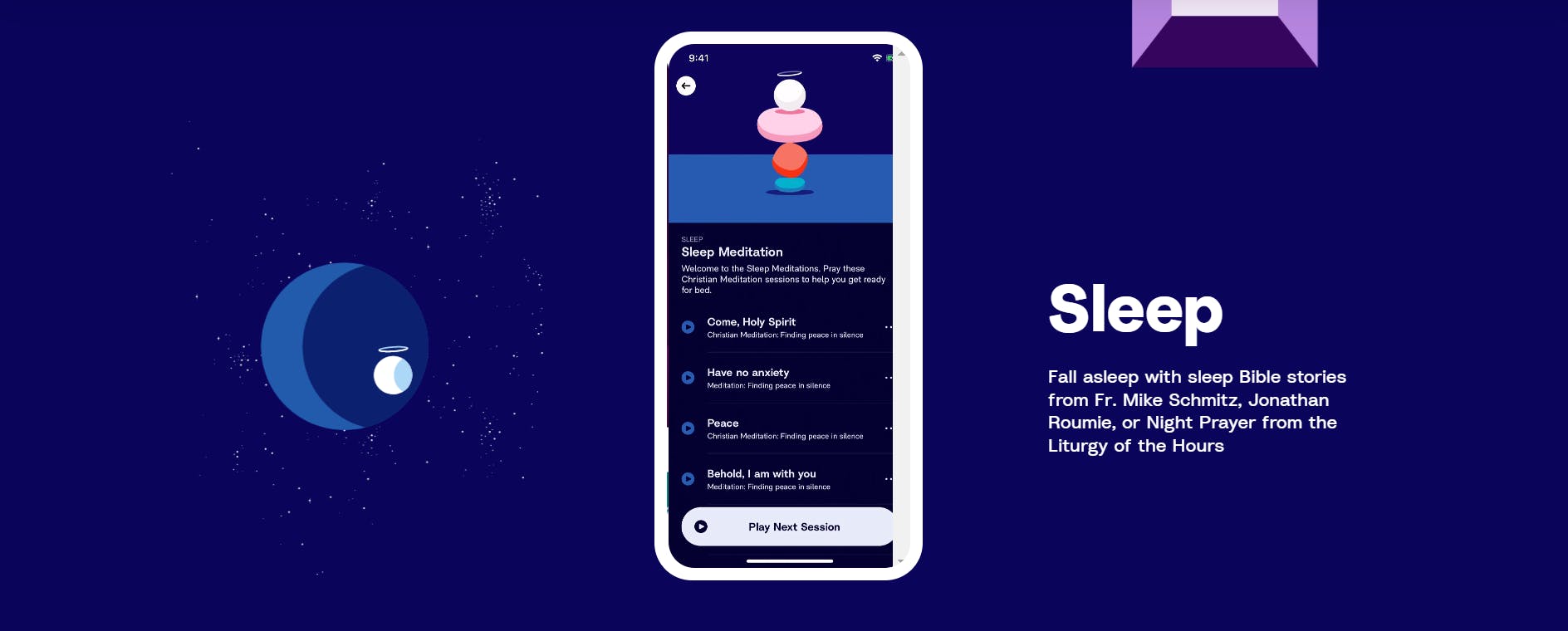
Source: St Clement’s Parish
Journaling
Hallow's journaling feature allows users to record their reflections and thoughts on their prayer practice. Users can write notes, record their progress, and even attach photos to their entries. This feature helps users track their growth and better understand their faith journey.
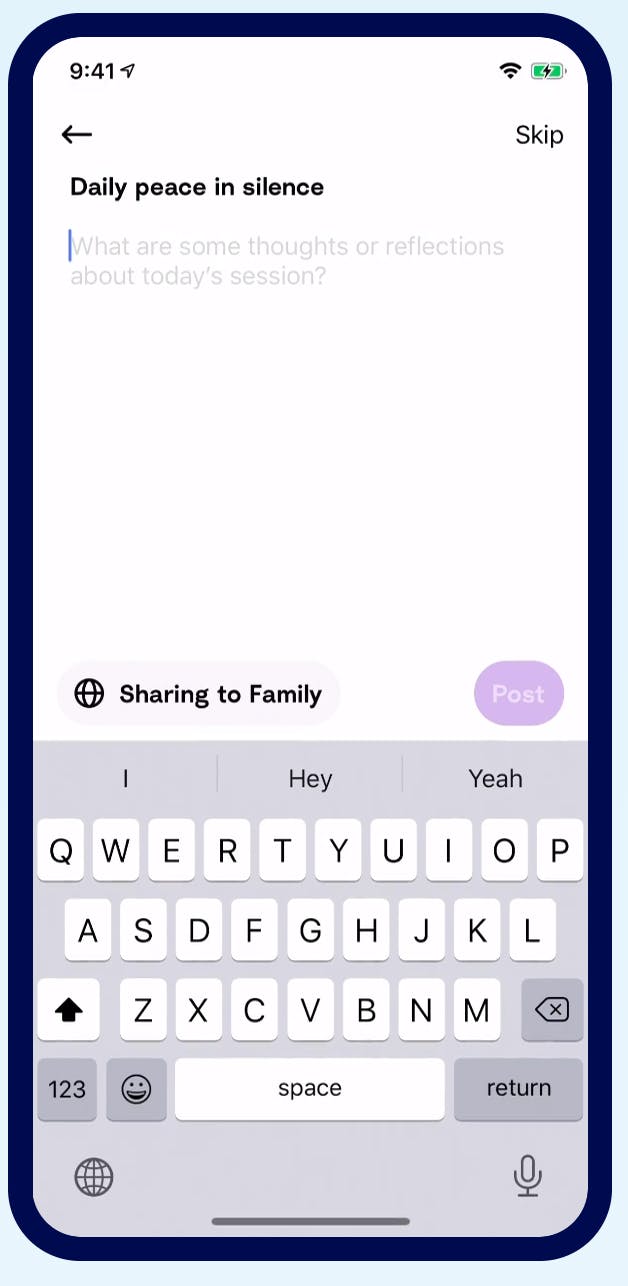
Source: Hallow
Market
Customer
Jones breaks down the target customer into the three following segments:
Christians who already meditate: The first and most obvious market for Hallow is for Christians who already meditate and have searched for ways to meditate within their faith tradition. These users are looking for guided meditations rooted in Christian teachings and values. They can be reached through targeted content marketing, partnerships with Christian organizations, and social media platforms.
Catholics struggling with prayer: Catholics who are struggling with their prayer lives but haven’t yet acknowledged to themselves that they feel less engaged in prayer or their spiritual life. These users might seek tools and resources to help them re-engage with their faith and establish a consistent prayer practice. They may benefit from introductory and beginner content explaining meditation and prayer's benefits in a Christian context. Outreach to this group involves creating awareness about the importance of prayer and meditation in daily life in Catholic institutions and organizations.
Spiritual but not religious individuals: These individuals are interested in spirituality but do not identify with a specific religion. These users seek spiritual and personal growth and may be interested in exploring Christian meditation and prayer to deepen their spiritual practice. Of this group, Jones noted the different approach that Hallow takes compared to traditional interdenominational church-based missionary work, which often tries to begin with teaching the philosophical worldview of a particular faith before moving into the practice. As Jones put it:
“The instinct, is to say, ‘You’re spiritual, but not religious—well, let’s tell you all the reasons you should be religious, and these are the things you should believe.’ What if instead you could lead with the spirituality and peace of our faith? And I think that is the thing that people are hungry for, and then use that as the starting point to bring them much deeper into the fullness of the faith, with the sacraments and community and beliefs and philosophy.”
Market Size
Consumers rising emphasis on mindfulness is a key driver behind Hallow’s market. Mindfulness meditation has been shown to create lasting structural changes in the brain. Some research has highlighted how mindfulness increases gray matter density in regions associated with learning, memory, emotion regulation, and perspective-taking. Gray matter, made up of neuronal cell bodies, is essential for processing information and supports tasks like retaining knowledge, regulating emotions, and understanding others. For example, in an eight-week mindfulness program, participants showed increased gray matter density in the hippocampus, a region crucial for memory and emotional regulation. This area, often damaged by chronic stress, plays a key role in building resilience and mitigating stress-related conditions.
Neuroimaging studies also show mindfulness strengthens attention and emotional control by impacting specific brain regions. The anterior cingulate cortex, which manages focus and mental flexibility, consistently shows increased activity and structural changes with regular practice. Mindfulness has also been linked to reduced gray matter density in the amygdala, the brain’s center for processing anxiety and stress. These changes help explain mindfulness’s role in lowering negative emotional states. They suggest that its benefits extend beyond active meditation sessions, as long-term practitioners show enduring shifts in brain activity.
Mindfulness also affects large-scale brain networks. For instance, the default mode network, associated with self-referential thinking and rumination, shows reduced activity in mindfulness practitioners. This decrease is linked to improved self-awareness and less overthinking. Importantly, these brain changes are dose-dependent—more frequent practice leads to greater reductions in stress and anxiety.
As awareness and prescription of meditation techniques grow, the global mindfulness meditation app market is expected to expand significantly to reach $1.5 billion by 2034, growing at a CAGR of 8.4%. Alongside this growth, faith-based meditation and prayer apps have emerged as a rapidly growing subcategory, blending traditional spiritual practices with mindfulness. By 2021, venture funding for religious apps, primarily Christian ones, reached $175.3 million, dramatically increasing from just $6.1 million in 2016 to $48.5 million in 2020.
The COVID-19 pandemic significantly changed believers’ behavior, creating a strong tailwind for prayer apps like Hallow, driving “years of adoption in weeks.” Because churches had to shut down due to social distancing, churches and churchgoers increasingly had to turn to technology to maintain prayer habits and access church communities.
The pandemic also contributed to increased religiosity in the US — a third of Americans said their faith grew stronger during the pandemic. Another indicator of the significant market opportunity at the intersection of Christianity and mobile apps is the proliferation of the Bible App (essentially a digital Bible), downloaded on over 700 million unique devices as of August 2024.
As of 2024, an estimated 2.5 billion people worldwide identified as Christians, accounting for nearly one-third of the world’s population. Catholics were the most populous denomination, with 1.3 billion people worldwide in 2024, followed by Protestants and Eastern Orthodox Christians. In 2023, 79% of Catholics said that they prayed every week, and 55% of Americans reported praying daily.
Competition
Pray: Founded in 2016, Pray is a mobile application that provides users with a library of prayers and daily devotionals. The app has over 18 million downloads as of January 2025 and offers free and paid content. Pray also provides a social media platform for religious communities where congregations can create their own groups. Pray has raised $34 million in financing as of January 2025.
Daily Prayer App: Founded in 2019, the Daily Prayer App is a mobile application that provides users with daily prayers and Bible readings. As of January 2025, the app had over 100K downloads on the Google Play Store and offered free and paid content.
Bible App: The Bible App provides users access to a digital Bible in multiple translations and languages. As of December 2021, the app was on over 700 million devices and offered both free and paid content. YouVersion, the company behind the Bible App, was founded in 2008.
Glorify: Glorify is a daily Christian worship and well-being app that aims to strengthen a user's relationship with God through bite-sized daily devotionals. It offers guided meditation, along with audio bible passages and Christian music. It was founded in 2020 and has raised $84 million in funding as of January 2025.
While most apps offer prayers and devotional content libraries, most lack guided meditations, sleep stories, playlists, personalized prayer routines, and other features that Hallow has that make it a more comprehensive tool for users than other options.
Business Model
Hallow operates on a freemium model. The app is free to download and has a free version with basic features. In the US and English-speaking regions, Hallow has a $9.99 monthly subscription (or a $69.99 annual subscription) that unlocks premium content. The pricing varies in other areas, such as Poland and the Philippines. All paid subscriptions start with a free trial, so users can try the premium content for free before deciding whether to pay.
Hallow also offers a $119.99/year family plan that supports up to 6 accounts, a $2.50/month plan for students, 50% off for Catholic School educators, and parish-wide subscription packages. For every subscription purchased, Hallow pledges to give a subscription to organizations in need (e.g., faith immersion programs, retreats, Christian non-profits).
Traction
In December 2021, Hallow disclosed that it had crossed the 1.5 million downloads mark and 25 million prayers completed. In September 2021, it said the revenue grew 500% year-over-year. Then, in September 2022, it was reported that Hallow had crossed 3.7 million downloads and had over 100 million prayers completed across 150 countries. This means that in ~9 months, Hallow more than doubled downloads and quadrupled the number of prayers completed. As of April 2023, Hallow’s job listings noted that they’ve crossed 7 million downloads and 150K 5-star review marks, indicating continued strong user growth. In May 2023, Hallow had 10 million downloads and crossed 225 million prayers completed.
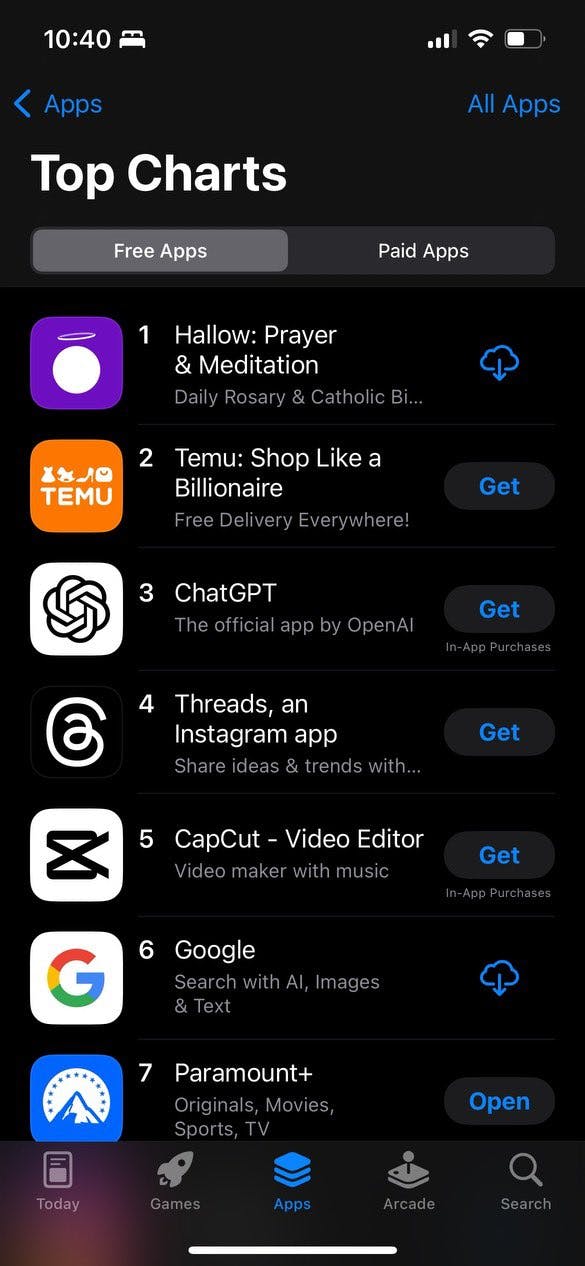
Source: X
In February 2024, Hallow made history by becoming the first religious app to reach the No. 1 spot on Apple’s App Store, shortly after a spike in downloads spurred by their 30-second Super Bowl ad featuring prominent Catholics like Mark Wahlberg and Jonathon Roumie. As of August 2024, over 600 million prayers have been completed through the Hallow app. In August 2024, DiSanto noted that around 40% of Hallow’s user base does not identify as Catholic.
Valuation
In May 2023, the company announced a $50 million Series C led by Goodwater Capital, bringing its total funding raised to $105 million. It did not disclose its valuation as of its latest round. Hallow is structured as a public benefit corporation, which means that the company has a responsibility greater than just shareholder value creation; Hallow has to stay committed to its social mission of helping users grow in their faith.
Key Opportunities
Growing Global Christian Population
The global Christian population is expected to experience substantial growth in the coming decades, from 2.5 billion in 2023 to around 3.3 billion by 2050. Christians have the second highest birth rate amongst the largest religious groups (trailing only Muslims) at 2.7 children per woman. In particular, sub-Saharan Africa’s Christian population is expected to double by 2050. Overall, this presents Hallow with a large user population and a growing total addressable market.
Celebrity Collaborations
Hallow has a significant growth opportunity through collaborations with well-known Catholic public figures. By partnering with influential Catholics in the public sphere, Hallow can leverage its popularity to reach a broader audience than would otherwise be possible.
One example of this strategy is Hallow's partnership with high-profile actors like Liam Neeson and Mark Wahlberg on their advertising campaigns. According to DiSanto, these collaborations require a delicate balance between using celebrities to help evangelize the app and keeping the focus on the app's message instead of any one particular person. However, high-profile celebrities can help to introduce new audiences to the app in a way that lesser-known theologians simply cannot.
Another example is benefiting from the tailwind of the popularity of "The Chosen" series, which has gained a massive worldwide following. Hallow has also partnered with Jonathon Roumie, the Catholic actor who plays Jesus in the series, as the voice artist in many of the app's meditations, prayers, and sleep content. "The Chosen" is a dramatized TV series about the life of Jesus Christ. Season 1 was launched in 2019 after one of the most successful crowdfunding campaigns by over 16K donors contributed to the initial costs of producing the show. By January 2024, "The Chosen" has achieved broad viewership and mainstream appeal, with over 200 million unique viewers from 175 countries worldwide.
Partnerships with Catholic Organizations
Hallow has a growth opportunity to establish deeper partnerships with Catholic organizations to have a direct channel to a large and engaged Catholic audience. Hallow has pursued this channel from its earliest days. Immediately after launch, Hallow reached out to “parishes, dioceses, Christian organizations, Catholic high schools, etc... Any organization that shared in the mission of bringing people to God.” Continuing to deepen its partnership with the Church could help the company acquire and retain users.
Penetration into Other Geographies
Hallow could deepen its penetration in other geographies beyond its core base in the US. Though it already has users in 150 countries, it could benefit by creating more content tailored to specific countries and languages. For example, the three countries with the most prominent Catholic populations are all primarily non-English speaking (in order, these are Brazil, whose primary language is Portuguese; Mexico, whose main language is Spanish; and the Philippines, whose primary language is Tagalog). The US only accounts for ~6% of the world’s Catholic population, so many user growth opportunities exist in other geographies. By expanding into new regions, Hallow could tap into the large Catholic populations in Latin America, Europe, and other parts of the world. Deepening its penetration into other geographies could help Hallow become a global platform for Catholics seeking to deepen their relationship with God through prayer and meditation.
Becoming a Media Platform
Hallow has a growth opportunity to expand to become a broader content and media platform, as this could enable the app to reach a wider audience and create additional revenue streams. By expanding into other forms of media, such as podcasts, video content, and books, Hallow could deepen its engagement with existing users and attract new users looking for a more comprehensive approach to their spiritual lives. This expansion could also provide opportunities for collaborations with other faith-based organizations and influencers, further growing Hallow's reach and impact.
Key Risks
Christianity Declining in the US and Europe
While the global trend for Christianity has been growth, the story is different in some major markets. Over the past few decades, Christianity has experienced a decline in the US and Europe. The share of Catholics and Protestants as percentages of the total US population has shrunk. The percentage of adults who reported attending church at least monthly has declined from 54% in 2007 to 45% in 2019, and the percentage of Americans who identify as Christian is expected to decline from 78% in 2010 to 66% in 2050.
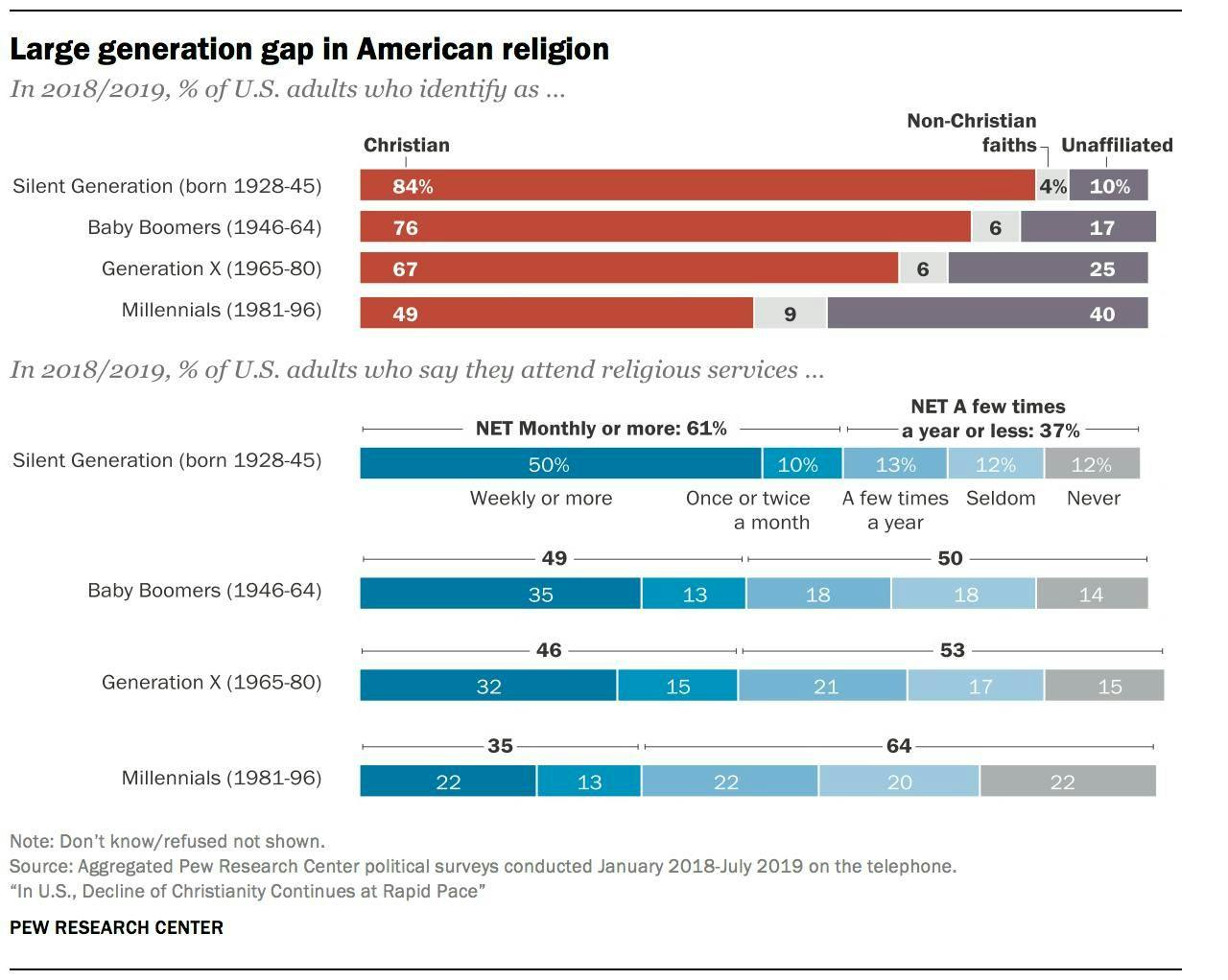
Source: Pew Research
The same trend is present in Europe. Europe’s Christian population is “expected to shrink by about 100 million in the coming decades.” The US and Europe represent wealthier markets with higher consumer discretionary spending and higher customer LTVs, so the decline of Christianity in both geographies could prove a market headwind for Hallow, even as the total Christian population worldwide continues to grow because of birth rates in developing markets.
Potential for Political Controversy
As the app grows, it may face pressure to take a stance on controversial topics on which the Catholic community may have preexisting stances. The app isn't immune from the politicization of Christianity, especially in the United States, where religious ideas can create sharp divides (even across denominations) on topics as diverse as whether abortion should be legal and the inclusion of LGBTQ+ people in churches. Strong stances on these and other topics on either side could lead to backlash from some users or negatively impact the app's reputation. Vice, for example, has already published an editorial piece criticizing Hallow on this front. Along those same lines, the app has also faced criticism for its partnership with Liam Neeson due to his pro-choice stance on abortion. Hallow will need to navigate these challenges carefully to avoid alienating its user base and focus on the primary mission of the app while also avoiding drawing negative attention from the media.
Summary
With approximately a third of the world's population identifying as Christian, many seek new ways to deepen their faith. The rise of internet applications and mobile technology presents an opportunity for individuals to connect with their faith in a more accessible and personalized way, in the same way that meditation apps have helped tens of millions become more spiritual. Hallow was founded to help users deepen their relationship with God through prayer and meditation, offering a range of features designed to help users incorporate prayer into their daily routines. Hallow could become the default way that 1.3 billion Catholics engage with their faith outside of physically going to church, giving them an accessible and convenient way to integrate prayer and meditation into their daily lives and fostering a stronger sense of community and connection among Catholics worldwide.
*Contrary is an investor in Hallow through one or more affiliates.


